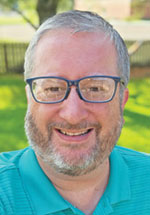Sight Unseen / Brandon A. Evans
There but for the asking

In the Gospel of Luke, a woman afflicted with hemorrhages reaches out to touch the tassel of Jesus’ cloak and is healed.
He stops and notes, “Someone has touched me; for I know that power has gone out from me” (Lk 8:46).
It’s a curious phrase: power has gone out from me.
It implies that while the power of God is infinite, it’s also quantifiable—like a bottomless river still bounded by its banks; something that could be tapped by mere human hands and measured out by faith.
In the very next chapter of Luke, the nature of miraculous power is taken even further: the Apostles—even Judas—are given the power to heal.
It’s a shocking thought: ordinary men walking around, the ability to draw out spiritual poison tingling in their fingertips; fishermen and scoundrels choosing who among the uncurable would wake whole the next morning.
As Peter would later say in the Acts of the Apostles, the miraculous was his to give.
What seems extraordinary to us was an ordinary part of Jesus’ ministry. He even harshly called out the failure of his disciples to cure a lunatic—not because such a thing is preposterous but because he expected them to do it.
Does he want less of us today?
We live our faith considering that miracles are the exception, but they are not. We are not meant to be resigned to timid prayer excused by the idea that God only rarely wills the extraordinary, or that we’re not worth asking for it. We are called to believe boldly—to summon the mercy of God as if it were ours to command.
Christ beckons us to reach into an endless ocean of mercy and bend streams of grace toward the parched corners of the world: to rush peace into chaos and light into darkness.
St. Faustina Kowalska knew this. The diary of her visions of Jesus bristles with his seemingly endless insistence that we have no idea what his mercy is capable of, and how little we have invoked it.
St. Faustina’s power with God came not from her holiness but from her trust in that mercy. Her faith was so certain that she once requested of Jesus an inconceivable miracle: that he save the souls of every person who died on a certain day: Friday, Jan. 8, 1937 (Divine Mercy in My Soul, #873).
Every person. In the world.
Every sinner and unbelieving soul and flawed human being, regardless of circumstance or virtue or vice. All of them.
And, she records almost calmly, he did as she asked because she asked in love and with confidence.
By that measure, being able to command a mulberry tree to be uprooted and planted in the sea is a mere parlor trick.
Jesus’ words about mustard seeds and moving mountains are deadly serious, and he expects us to find a way to believe them. It was not hyperbole when he said nothing would be impossible for us (Mt 17:20).
Our ailing world is filled with sickness, war, despair, unreason, cruelty and malice. We nobly struggle to make things right with the work of our hands and the might of our intellect, but it isn’t enough. The wounds are too deep, and the task too big.
It’s easy to look and despair. How can we expect to heal so much suffering? Or put off the inevitable defeat?
It’s true: there is no possible way.
But there is an impossible way.
(Sight Unseen is an occasional column that explores God and the world. Brandon A. Evans is the online editor and graphic designer of The Criterion and a member of St. Susanna Parish in Plainfield.)†
